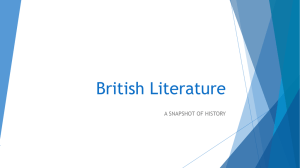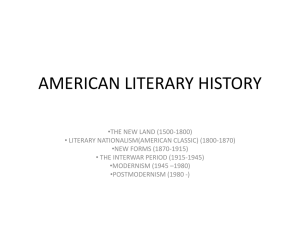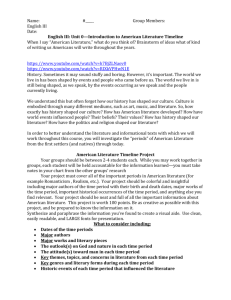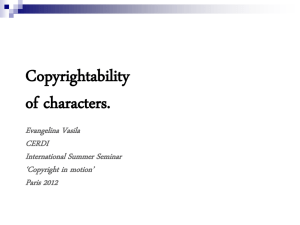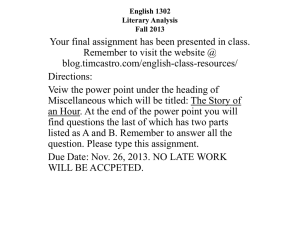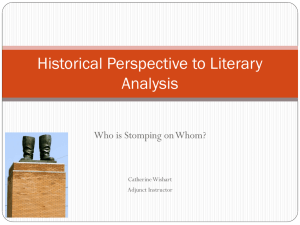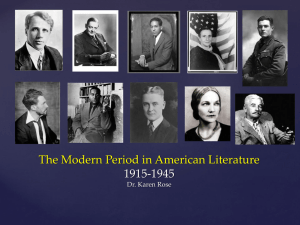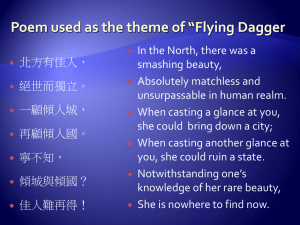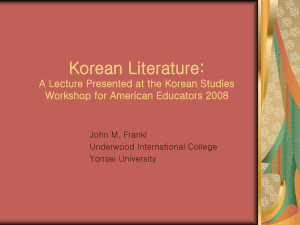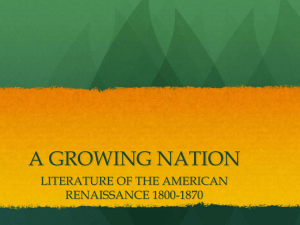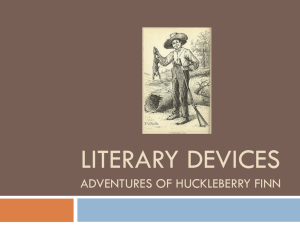British Literature History Powerpoint
advertisement
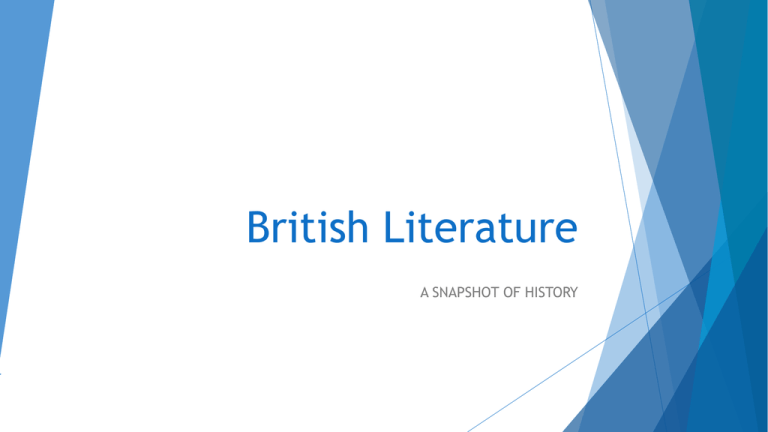
British Literature A SNAPSHOT OF HISTORY Unit 1 Old English/Medieval Times (A.D. 449-1485) What important historical events happened during this time period? Around the World? 449 Fall of Rome 552 Buddhism 591 China book printing 597 St. Augustine introduces Christianity 1020 Vikings invaded America 1066 Normandy invasion-Feudalism 1291 End of Crusades (wars in Europe) 1381 Bible translated to English 1450 Printing press invented-revolutionized world 1455 War of Roses begins Unit 1 Old English/Medieval Times (A.D. 449-1485) Who are some of the notable authors and what are they famous for writing? In Anglo Saxon times stories were passed down orally Beowulf – no author, translated by the Monks The Canterbury Tales – Geoffrey Chaucer What social and economic characteristics were unique to this time period? Hierarchy structure-male dominated Anglos-Saxon -- tribes/families Middle Ages -- Kings/Lords/Knights/Peasants (FEUDALISM) Depend on leader-gained wealth by being loyal to leaders Middle class began to exist and gain wealth in LATE MIDDLE AGES Unit 1 Old English/Medieval Times (A.D. 449-1485) What are some reoccurring historical and literary themes from this time period? Invasions, wars, and spread of Christianity The Sea, Heros, Exile How did writers change how things were written? Stories may have changed over time because only told orally Stories stayed the same once they were written down What are some key British literary traditions from this time period? Groups of people going on trips Frame stories-story within a story The idea of a Hero Unit 2 Renaissance (1485-1625) What important historical events happened during this time period? Around the World? 1485 Henry VII first Tudor king-ended War of Roses 1492 Columbus lands in Western Hemisphere 1503 Italy: Leonardo da Vinci painted Mona Lisa 1509 Italy: Michelangelo paints ceiling of Sistine Chapel 1513 North America: Ponce de Leon explores Florida 1534 Henry VIII named Head of English Church (broke away from Catholic Church) 1563 Plague kills 20,000 Londoners 1564 William Shakespeare born 1582 New calendar introduced 1588 English Navy defeats Spanish Armada 1594 Shakespeare writes Romeo and Juliet 1599 Globe Theatre opens 1603 Elizabeth I dies 1607 North America: Jamestown established 1609 James I dies Unit 2 Renaissance (1485-1625) Who are some of the notable authors and what are they famous for writing? William Shakespeare – MacBeth King James Bible – translated by committee of scholars What social and economic characteristics were unique to this time period? Changes in the Church – people became less religious Writers flourished with invention of printing press Renaissance- “rebirth” revive learning of ancient Greece and Rome Reformation-Martin Luther, return Catholic church to original principles broke (PROTESTANTS) Ruled by a King Rise of Middle Class and Explorers Trade-West India Company Unit 2 Renaissance (1485-1625) What are some reoccurring historical and literary themes from this time period? Classical authors were inspiration Science was encouraged Politics Illusion and reality How did writers change how things were written? Humanism – emphasis on what it like to be human (tried to harmonize Bible w/classics) Shakespeare expanded our vocabulary with his invented words What are some key British literary traditions from this time period? Translations of older works to reach broader audiences Bible translated into English New form of drama combined classical models of comedy and tragedy Shakespeare made drama secular (non-religious)(1st dramas were church based) Unit 3 Seventieth and Eighteenth Century (1625-1798) What important historical events happened during this time period? Around the World? 1642 English Civil War begins 1649 Charles I beheaded 1653 Oliver Cromwell becomes Lord Protector 1666 Great Fire of London 1685 James II becomes king 1689 Bill of Rights becomes law 1702 First daily newspaper begins publication 1707 Great Britain created by Act of Union 1714 George I becomes king 1752 North America-Benjamin Franklin invents lightning rod 1773 North America-Boston Tea Party 1776 North America-American Revolution begins 1789 French Revolution Unit 3 Seventieth and Eighteenth Century (1625-1798) Who are some of the notable authors and what are they famous for writing? John Donne – “Song” Samuel Johnson – Dictionary of English Language John Milton – Paradise Lost Daniel Defoe – (journalist) Journal of the Plague Year Samuel Pepys – The Diary of Samuel Pepys What social and economic characteristics were unique to this time period? Separation of Church and State Cavaliers (aristocrats) vs Roundheads (class lower than aristocrats) Behavior of children Deism London Fire-caused money problems Industrial Revolution Agricultural Revolution Unit 3 Seventieth and Eighteenth Century (1625-1798) What are some reoccurring historical and literary themes from this time period? Love and religion Sonnets given tone and scope Revolution Distrust of government How did writers change how things were written? Novels, journals, and newspapers were written Nonfiction was introduced What are some key British literary traditions from this time period? Many works in similar format to the classics Essay and Novel introduced Middle class audience Read about themselves and people they would like to be Unit 4 Romantics (1798-1832) What important historical events happened during this time period? Around the World? 1801 Act of Union joins Great Britain and Ireland 1804 Napoleon crowns himself emperor 1812 War with United States 1813 Jane Austin publishes Pride and Prejudice 1799 Rosetta Stone discovered in Egypt (key to deciphering heiroglyphics) 1814 1st successful steamboat and locomotive (train) 1819 Trans-Atlantic steamboat 1827 Water purification system in London 1829 Metropolitan Police established in London 1831 United States-Edgar Allen Poe 1832 First Reform Act (England) extends voting rights Unit 4 Romantics (1798-1832) Who are some of the notable authors and what are they famous for writing? Blake – “The Chimney Sweeper” Wordsworth – Lyrical Ballads, “The Prelude” PB Shelley – “Ode to the West Wind” Keats – “Ode on a Grecian Urn” Mary Shelley - Frankenstein What social and economic characteristics were unique to this time period? Industrial Revolution created slums and poverty People began to be upset with what progress and science did to society (pollution, etc.) Steamboats and railroads revolutionized trade Spinning jenny and power loom invented-replaced the weaver Wealth no longer depended on land Unit 4 Romantics (1798-1832) What are some reoccurring historical and literary themes from this time period? Political oppression vs. political reform European rulers tried to roll back revolutionary ideas Reform Bill of 1832 extended the right to vote but not to the working class Seeking the faraway-distant lands or supernatural Nature seen as refuge-something to be worshipped Youth best time of one’s life Power of individual freedoms Unit 4 Romantics (1798-1832) How did writers change how things were written? Writers tried to change politics by exposing issues British ships traveled throughout the world and adopted words from other languages What are some key British literary traditions from this time period? Romantic refers to the faraway and exotic not love stories Rebellion against traditional literary forms and subjects Revealed personal thoughts and feelings in writings Revived the Sonnet and the Ode Sonnet- “little song” Ode- serious poem/praising/expresses deep feeling Comic Novel-Jane Austen Historical Novel-Sir Walter Scott Gothic Novel-Mary Shelley’s Frankenstein Unit 5 Victorian (1833-1901) What important historical events happened during this time period? Around the World? 1832 Slavery abolished in British Empire 1837 Queen Victoria crowned 1845 Irish potato famine begins 1848 Women began attending University of London 1859 Charles Darwin publishes On the Origin of Species (evolution theory) 1836 United States-Texas Alamo falls to Mexican army 1839 Michael Faraday, general theory of electricity 1844 Morse code over long distance telegraph 1861 United States – Civil War begins 1876 Alexander Graham Bell patents telephone Unit 5 Victorian (1833-1901) Who are some of the notable authors and what are they famous for writing? Tennyson – “Ulysses” Charles Dickens – Hard Times, Great Expectations, A Tale of Two Cities Elizabeth Barrett Browning – “Sonnet 43” Marx – Communist Manifesto What social and economic characteristics were unique to this time period? Optimistic spirit despite war, revolutions, and assassinations Problems with faith in God-Darwin (evolution) Newton (universe) Irish potato famine- 2 million people starved to death Territories and trade increased Unit 5 Victorian (1833-1901) What are some reoccurring historical and literary themes from this time period? Britain celebrated progress, prosperity, and peace Darker stories associated with the potato famine-poverty Spirit of exploration How did writers change how things were written? Reminded readers that empires crumble, individuals are fragile and vulnerable, and death awaits us What are some key British literary traditions from this time period? Elegy and sonnet used to address contemporary questions of belief and doubt Dramatic monologue-Robert Browning Melancholy poems- very sad, despairing Unit 6 Modern & Post Modern (1901-present) What important historical events happened during this time period? Around the World? 1903 Wright Brother-first successful airplane 1914 England declared war on Germany, entering into World War I 1939 Hitler invaded Poland: World War II begins-Britain enters 1940 Winston Churchill becomes Prime Minister 1941 United States enters WWII when Japan bombed Pearl Harbor 1945 United States drops atomic bomb on Japan; WWII ends 1948 Israel established 1952 Queen Elizabeth II crowned 1955 United States-Martin Luther King, Jr leads civil rights bus boycott 1961 Berlin Wall built 1963 United Stated-JFK assassinated 1965 Vietnam War 1967 Beatles Unit 6 Modern & Post Modern (1901-present) What important historical events happened during this time period? Around the World? 1929 Great Depression 1969 United States-Apollo 11 lands on the moon 1979 Margaret Thatcher becomes first woman prime minister 1986 Soviet Union-nuclear accident in Chernobyl Germany-Berlin Wall torn down-unification of East and West Germany 1991 Soviet Union dissolved 1994 Nelson Mandela elected President of South Africa 1997 Tony Blair becomes Prime Minister 2001 United States-planes crash into World Trade Center in NYC, PA, WDC Unit 6 Modern & Post Modern (1901-present) Who are some of the notable authors and what are they famous for writing? D.H. Lawrence – “Rocking Horse Winner” Elizabeth Bowen – “Demon Lover” William Butler Yeats – “The Second Coming” T.S. Elliot James Joyce Ulysses Sigmund Freud (Psychology) What social and economic characteristics were unique to this time period? Women gained social freedom-limited right to vote and change in dress Ordinary people gained access to higher education, healthcare, home ownership Fewer servants-men and woman began working in new industries Unit 6 Modern & Post Modern (1901-present) What are some reoccurring historical and literary themes from this time period? Conflicts and loss of Empire-England weakened from WWI and WWII Poems of war by “soldier poets” Poems about the true cost of war-blood and tears Materialistic attitude-automobile and stylish home How did writers change how things were written? Recorded the cost of conflict during the war Celebrated Diversity What are some key British literary traditions from this time period? Renewed poet as prophet Sonnets-radical change in subject matter and tone Short stories became global genre with diverse subjects and settings Writing more accessible through inexpensive books and internet
